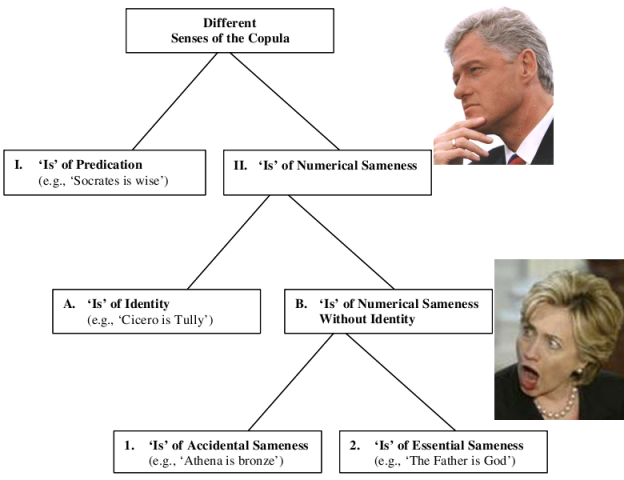podcast 216 – Bignon’s Defense of Calvinism – Part 1
Is compatibilism about human freedom the key to defending Calvinism?
Is compatibilism about human freedom the key to defending Calvinism?
To be omnipotent, Baber says, “is to be able to do [directly, by fiat] any action… including actions at times other than” the time at which one is omnipotent. (p.6) But consider, say, the action of miraculously inflicting some person with a headache on 1/1/2015. It seems that the Father, on this theory, couldn’t do that, as he wouldn’t exist then (having been superseded by… Read More »“Sabellianism Reconsidered” Considered – Part 5 (Dale)
I first encountered Sir Anthony Buzzard (yes, he’s a real “Sir”, and his wife Barbara a “Lady”) in the endnotes of Dallas Willard’s The Divine Conspiracy. Willard had referred to his short book The Coming Kingdom of the Messiah. Buzzard and Willard have in common a deep grasp of the good news of the Kingdom as preached by Jesus, and the centrality of God the Father to… Read More »podcast 44 – The Spiritual Journey of Sir Anthony Buzzard
A new book on the portrayal of Jesus in the Gospel According to John.
What is sometimes called the “Nicene Creed” and recited in churches is actually from this later council.
 I woke up this morning, and realized that there is a problem with how I’ve been defining the concept of a unitarian. In this post, I will attempt a definition of the concept of a trinitarian, after reviewing what is required of a good definition. Next time, I’ll try to define the concept of a unitarian.
I woke up this morning, and realized that there is a problem with how I’ve been defining the concept of a unitarian. In this post, I will attempt a definition of the concept of a trinitarian, after reviewing what is required of a good definition. Next time, I’ll try to define the concept of a unitarian.
According to the textbook I have used for years in my critical thinking class, a good definition should:
What is a trinitarian?
Definition 1: someone who believes in a triune god.
Dallas Willard is one of my favorite authors, and I don’t normally go in for criticizing what he writes. But I found a great example in this (good) book (p. 122) of an idea that is fairly widespread, and which underlies a lot of social trinitarian speculation. This brief passage got me to thinking. He says, …God is love and sustains love for us from… Read More »Are persons essentially relational?
“Incarnation” means initially that God’s love and power had been experienced in fullest measure in, through and as this man Jesus.
Is the Son God? In the immortal words of Bill Clinton, “It depends on what the meaning of the word ‘is’ is.” Brower and Rea suggest the following classification of meanings of “is” (in logic, “is” is called “the copula” – that which connects the subject and what’s being said of that subject).

Um, no the Clintons aren’t in the original chart in their paper (71).
And yes, Bill is intrigued by the word “copula”. Read More »Constitution Trinitarianism Part 3: The Meaning of “Is”
His views seem to have been those of present-day biblical unitarians.
St. Anselm was the Roman Catholic archbishop of Canterbury, and an important medieval Christian philosopher. He defined the concept of God as “that than which no greater can be thought.” Using this concept, he argues that there must actually be such a being; this is his famous “ontological” argument for God’s existence. And he also deduces that this being must be eternal, and omnipotent (etc.)… Read More »podcast 64 – Dr. Mark C. Murphy on Anselmianism about God
LaBreeska Hemphill is right. Jesus isn’t God; he’s the Son of God. God is a certain perfect self, the one both we and Jesus call “our Father” and “our God”. Jesus is a man – but by no means a mere man, to wildly understate the case. God is not a man, not, as C.S. Lewis would say, a Son of Adam. She’s not a theologian.… Read More »LaBreeska’s right
Do our earliest surviving post-New-Testament writings interpret Proverbs 8 as being about the pre-human Jesus?
Dr. Oliver Crisp’s Deviant Calvinism: Broadening Reformed Theology (kindle) has been blessed with excellent publicity. In several places, you can read or hear Dr. Crisp’s thoughts on the book, and get a good sense of what it is about. In the most recent episode of the trinities podcast, I discuss with him just how broad he thinks the Reformed tradition is. Next week we get… Read More »Deviant Calvinism roundup 1 – Crisp on Crisp
A humorous puppet-show about a serious subject: properly understanding what the New Testament teaches about Jesus and God.
What do both OT and NT clearly teach about who created?
 As Joseph explained in his last post, in his On the Trinity, Richard of St. Victor asserts the superiority of “shared love” (Latin: condilectus). He holds that it is superior to other loves in value and in the pleasure it involves. He’s imagining something like my chart on the left.
As Joseph explained in his last post, in his On the Trinity, Richard of St. Victor asserts the superiority of “shared love” (Latin: condilectus). He holds that it is superior to other loves in value and in the pleasure it involves. He’s imagining something like my chart on the left.
Look at the bottom case, and how the love arrows combine; this seems to be what Richard is imagining (see the quote in the last post). I don’t think it’s coherent, really – affections, or individual love-acts can’t literally fuse. Nor do I understand any non-literal way they can be said to “fuse”.
Still, I’m inclined to agree with Joseph and with Richard Swinburne that there is a unique value in lovers cooperating to love a third party. This is something we recognize, I think, in Mom and Dad’s love for junior, or even in “best friends” graciously including an excluded girl within their circle.
Further, I think Richard of St. Victor is right that there is a relational harmony and cooperation in such cases, and a unique sort of pleasure all around.
Whether this value would provide a perfect person with a compelling reason to create mysteriously originate at least two other divine persons is a further matter.
In chapter 20, Richard makes clear that my chart here is too simple – there should be aRead More »Richard of St. Victor’s De Trinitate, Ch. 20 (Dale)
A penetrating discussion of John 1 by famous Harvard scholar Andrews Norton.
My friend Dr. William Vallicella has yet another long and interesting post on the “same god” controversy. Along the way he makes a number of good points. Philosopher-style, I’ll hone in on the points I disagree with, in this and a follow-up post. Bill says, in part: 3. Now consider these conflicting beliefs: God is triune; God is not triune. Please note that it would… Read More »the “same god” controversy and Christian commitment – Part 1
Most conservative (and even, many not-too conservative) Christians belong to churches and/or denominations which affirm traditional language about the Trinity. In this series, I’m going to just put all this on the table, as the fact is, many Christians, especially those from less “confessional” traditions, aren’t very familiar with these traditional formulas. I’m not going to go too much into the history for now. The… Read More »The Orthodox Formulas 1: The Council of Nicea (325)